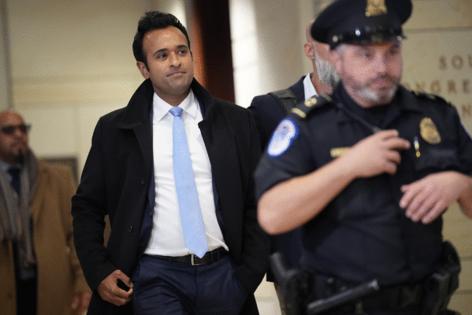Mihir Sharma: H-1B backlash shows Indians they're not so special anymore
Published in Op Eds
Indians have long been proud of what they see as their outperformance in the information technology sector. Companies such as Infosys Ltd. and Tata Consultancy Services Ltd. dominate IT-enabled services, bringing home billions of dollars in profits. U.S. technology giants including Alphabet Inc., Microsoft Corp., and International Business Machines Corp. have Indian-origin CEOs. India-trained engineers labor in the trenches of Silicon Valley and invisibly help Western companies adapt to the digital age.
It turns out that others have noticed this as well, and they aren’t happy. Over the past fortnight, Indians have watched aghast as victorious Republicans in the U.S. have torn into each other over the future of H-1B visas.
The temporary work permits are the only real way to employ Indian immigrants in the U.S., since national caps make it nearly impossible for them to get a green card. What quickly became clear was that the intra-GOP argument had less to do with fixing the H-1B system than whether all these Indian engineers were welcome in the first place. Some on the left, like Sen. Bernie Sanders, joined in the right’s chorus, deriding H-1B recipients as “low-wage indentured servants.”
The controversy seems oddly outdated to anyone familiar with the Indian IT sector. Its leaders decided years ago to shift their business model away from arbitraging lower wages. Digitalization has progressed enough that many lower-end jobs can be done at home, or replaced entirely by AI; either way, the old model of shipping engineers abroad as IT support isn’t likely to last. That suggests this debate isn’t really about policy after all.
The Indian diaspora, especially in the U.S., has reason to worry. The conventional wisdom is that we represent a model minority, the “good” immigrants. Nobody worries about us, nobody resents us. We are all doctors, engineers, and CEOs anyway — we earn more than anybody else, and we pay our taxes dutifully.
Indians fully expect to follow the pattern of European immigrant groups, eventually becoming an acceptable part of the background scenery in their host countries and cruising to the top of the establishment without provoking a nativist backlash. Many immigrants, including in Britain, are so wed to this notion that they are quite comfortable with anti-migrant political parties and movements. Yes, they’re making a list of undesirables, but we will never be on it, right?
Clearly, the conventional wisdom is wrong. All it took for this to be discovered was a couple of Indians being given minor positions in President-elect Donald Trump’s incoming administration. All those quiet, industrious engineers aren’t as invisible as they thought: They have been seen, and they are resented.
The debate has exposed a deep divide in the Trump coalition between his older ethno-nationalist fan base and newer Silicon Valley allies like Tesla Inc. Chief Executive Officer Elon Musk. The latter argued on his social media platform X that H-1B visas were needed because the “fundamental limiting factor” for the U.S. tech industry was “a permanent shortage of excellent engineering talent.”
Many Indian Americans would have hoped Democrats would side with Musk, especially in the face of opposition from a nativist right-wing in thrall to fears of a “great replacement.” Yet even Silicon Valley’s own congressman, progressive Rep. Ro Khanna, has expressed skepticism about H-1Bs. The program needed reform, he said, “to make sure American workers are never replaced.” That unsettling turn of phrase didn’t go unnoticed.
Indians cannot ignore the new political climate sweeping the West. The fact is they will be as much a target for populists and ethno-nationalists as other immigrant communities to whom they imagine themselves superior. Just like them, they will have to organize politically, abandoning the social and political divides that hold back the home country.
As recently as last year, Indians at home and abroad could revel in their political prominence. The outgoing British prime minister, Rishi Sunak, was of Indian heritage; the Democratic nominee for president, Kamala Harris, was partly of Indian descent. So was a contender for the Republican nomination, Vivek Ramaswamy.
But, it was Ramaswamy’s brash declaration that foreign-born or first-generation engineers were not tainted by an American culture of mediocrity that sparked off this dispiriting discussion in the first place. Perhaps this year the diaspora could try being a little less cocky about how its supposedly superior culture has earned it a privileged place in the West.
____
This column does not necessarily reflect the opinion of the editorial board or Bloomberg LP and its owners.
Mihir Sharma is a Bloomberg Opinion columnist. A senior fellow at the Observer Research Foundation in New Delhi, he is author of “Restart: The Last Chance for the Indian Economy.”
©2025 Bloomberg L.P. Visit bloomberg.com/opinion. Distributed by Tribune Content Agency, LLC.




























































Comments